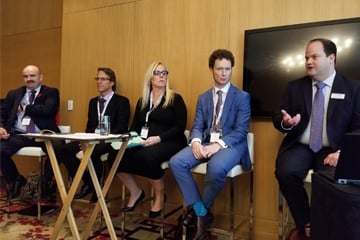
Lawyers must thrive in a world where information is readily available and growing exponentially and that includes small law firms even if they don’t have specialized e-discovery or technology-related departments, according to a panel of experts on the subject.

Lawyers must thrive in a world where information is readily available and growing exponentially and that includes small law firms even if they don’t have specialized e-discovery or technology-related departments, according to a panel of experts on the subject.
The surge of documents and growing size of files means that new challenges arise and the way documents are accessed must also evolve. E-discovery technology can help in using documents efficiently, even in small law firms, said Sean Lynch, manager of legal solutions at Commonwealth Legal who moderated a panel called "Evening the Playing Field" at the Technology in Practice conference in Toronto Nov. 9.
“We have a unique opportunity as small firms because of the challenges that these changes create for us. I think one of the things that my firm has consistently tried to model is a culture within the firm of change — that we’re prepared to take on change, adapt to change,” said James LeBer, managing partner of Advocates LLP in London, Ont. “We see it as a competitive opportunity for us.”
LeBer added that as lawyers are being exposed to increasing numbers of documents and data management challenges, small firms often don’t have the budget for special departments within the firm to combat these challenges.
Small firms don’t want to lose clients to larger firms, which might have additional resources, said Lisa Evenson, paralegal and e-discovery specialist at Harper Grey LLP in Vancouver. Clients demand the “proficiency” of e-discovery tools and often progress quicker than the legal profession in adopting new technology.
Since cost is often a barrier for small firms that would like to utilize e-discovery tools, the panel shared some tips including outsourcing e-discovery work or sticking to only one database that suits the majority of needs.
Matthew Gottlieb, partner at Lax O’Sullivan Lisus Gottlieb LLP in Toronto, said that some platforms are better for varying numbers of documents. For example, if there is a high volume of documents, certain programs are faster at processing the data but can be more expensive. Selecting the database type on a case-by-case basis or even using external vendors that could manage the data are some ways around high costs for smaller firms on leaner budgets.
When Lynch asked the panellists if e-discovery furthers access to justice when it comes to serving clients, Ewan Christie, associate at Levitt LLP in Toronto, said that it’s just another business tool in getting the job done.
He added that “it’s going to hopefully save money” for clients because less time spent going through data manually means lower costs for working time (the billable hour).
However, Gottlieb disagreed with Christie’s view. “It hurts the client’s ability to get justice because you spend so much bloody money on documents that rarely matter,” he said.
“We have cases where we literally had three-and-a-quarter-million documents and when the judgment came up, I think the court referred to one document."
Even with a mixed view on whether or not e-discovery enhances access to justice, the panellists were on the same page about how documentation and data are becoming paperless as firms are starting to adopt digital files of exhibits over paper copies in the courts.
“You’ve got a lot of older litigators, like me, and we grew up in an age of paper,” said Gottlieb. “[This one] trial started to be a paper trial with a lot of electronics . . . By the end of the trial, the judge said, ‘Don’t hand me paper. I’ve got it on the screen. I’ll save it to a folder. I’m going to get an electronic exhibit book.’”
This anecdote illustrates the way the profession is changing and slowly beginning to adopt the use of technology and digital documentation, and digital data can be accessed remotely, promoting flexibility for small firms.
“I got a data set Monday and I literally have a lawyer lying on a beach in Cabo [San Lucas] right now looking at that data on an iPad,” said Evenson.